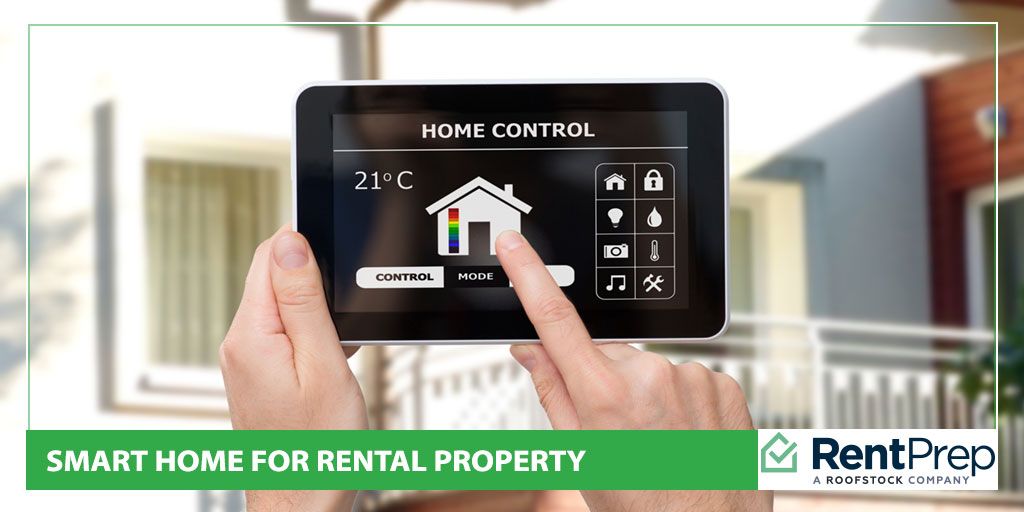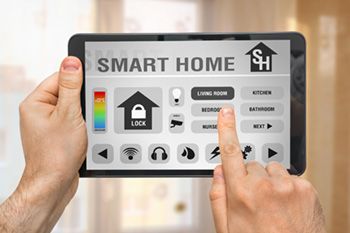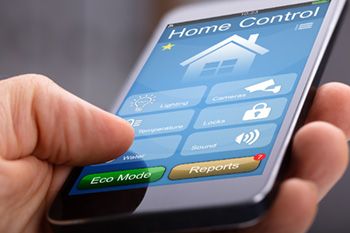
Smart devices are more affordable these days and thus more commonplace than ever. Homeowners and renters alike are interested in the security, convenience, and integration that having this home technology provides.
Does this also mean that creating a smart home for rental property purposes makes sense?
As with many things in the real estate business, that depends on your property management style. However, not exploring this option would be a big miss for any landlord. Installing smart devices is often easier than you may imagine, and the return on that relatively small investment could be huge.
Don’t miss out on a chance to grow your business with simple yet innovative solutions. Learn more about smart home rental property options today.
A Table Of Contents On Smart Home Rentals
Ready to find out what making your rental a smart rental is all about? Dive into this exciting opportunity with us:
- What Is A Smart Home?
- Smart Home Rentals: Why They Make Sense
- Smart Homes For Rent: Key Features To Include
- FAQs On Smart Homes For Rent
- Start Prepping A Smart Home For A Rental Property Today
What Is A Smart Home?

A smart home is a property strategically fitted with smart technology that allows for greater control over the home’s functionality. Door locks, security cameras, thermostats, and more may all be controlled from a single operating device, depending on the setup.
The complexity of a smart home system varies immensely from property to property. Large, high-end properties are likely to be outfitted with the complete works, including a central security system, while many rental apartments won’t have much more than keyless door locks.
There are even smart devices for everyday tasks like brewing coffee and grocery shopping: Smart coffee machines brew at a specific set time; smart refrigerators keep a running list of what you have inside, and you can access that list while at the store.
The critical point is interconnectedness. Apps on your smartphone or laptop control how the smart devices function. This creates a simple, convenient system that can be used both at home and away to control lights, temperature, and more.
Smart Home Rentals: Why They Make Sense
What’s the point of installing these systems in rental properties?
It’s true that smart devices won’t be a good investment for every property, but the benefits may be more significant than you might expect. Many landlords who install these systems claim that the biggest bonus is how the devices improve overall maintenance and building upkeep.
Smart home rentals:
- Attract a new type of tenant
- Improve security for tenants and the property itself
- Prevent property damage
- Make managing unoccupied properties from a distance more feasible
- Increase rent
Utilizing smart devices becomes more common every day. Soon, it’s likely that more than 50 percent of tenants will expect to see some sort of smart technology used to ensure their safety and convenience when renting a property. Are you prepared for this change?
Smart Homes For Rent: Key Features To Include
As previously mentioned, smart home devices come in many shapes and sizes. Some improve safety, while others just make life easier. Which features will most likely enhance ROI through rent increases and more rentals?
Consider these categories as you plan to utilize smart technology in rental properties.
Keyless Door Locks
The #1 reason most tenants are interested in smart home technology is to enhance the safety of the property. Security is important to renters, and investing in this area can pay off.
Smart locks, such as keyless doors, unlock via pin codes, Bluetooth, or smartphones. These locks don’t need to be replaced when changing tenants, and it’s possible to wipe previous data relatively quickly.
These locks are a great way to protect both tenants and the property. There are many levels of keyless locks available, so consider what makes the most sense for your budget, tenants, and property type.
Smart Lighting
Another area attractive to tenants and landlords is lighting. Smart lighting combines convenience and safety for an intelligent solution that just makes sense.
Outside, you can install motion-activated lighting that includes remote monitoring options. This is key for common areas such as parking lots where you want to keep tenants feeling safe. Cameras deter thieves and protect tenants; smart cameras increase their effectiveness.
Inside, smart lighting options vary from complicated installation of controllable lights or temporary installation of smart plugs. Smart plugs are the preferred option for many due to their simplicity, and landlords find them to be the best of both worlds. They can be installed without damaging any walls while providing safe effectiveness.
For our top recommendations and a review of smart bulbs for your rental home, check out this video:
Utility Devices

Another category that tenants appreciate in smart homes is utility monitoring and control. Utility costs, such as water and electricity, can get expensive. Tenants often cover these costs directly, so they are likely to be interested in ways to improve their efficiency.
Smart plugs that remotely control electronics and smart thermostats that improve HVAC efficiency are just two of the many ways utility monitoring and control devices can be a financial lifesaver for tenants.
Smart thermostats require a more extensive installation, but it’s still economical for most properties. Considering that more than half of the energy used by a household each year is for heating and cooling, finding ways to reduce this energy burden is essential. These devices measure energy use and even learn behaviors for more efficient heating and cooling.
Smart Appliances
Landlords providing appliances in high-end properties often install smart appliances. They are a bit more expensive, but their technology balances out the cost. Connecting from your phone or tablet enables control of each appliance, monitoring, and energy improvement. Tenants are often willing to pay for the upgrade when negotiating rent.
Looking For More Landlord Resources?
The increasing desire for smart home technology in modern rentals is just one of the many things landlords need to keep up with. It’s nearly impossible to know everything about the rental community, and it’s even harder to find the time to research all of it yourself.
Stay updated with the latest rental news by signing up for our newsletter today. In addition to access to various free landlord form templates, you’ll also get updates about crucial policy changes and market trends that affect your business daily.
FAQs On Smart Homes For Rent
Smart home technology is modern and cool, but how exactly does it fit in with your rental business? The answers to these frequently asked questions can help you gain a new perspective on smart homes.
What is a smart home in rental property?
Smart homes for rental properties are the same as other smart homes: They are outfitted with home automation systems and smart technology devices. These devices are intended to simplify control of specific features in the house. Supplementing locks, thermostats, and lighting with advanced technology creates a pleasing, efficient, and easy-to-manage atmosphere.
Smart rental properties may involve challenging installation for things like smart keyless door locks or package lockers, or they may be incorporated on a smaller scale with voice automation devices and smart plugs, for example. Regardless, incorporating smart technology into the rental market is becoming increasingly popular.
What is the ROI of installing smart technology in rental units?
Calculating ROI, or return on investment, is a key practice for landlords when completing upgrades. The same goes for installing smart technology. It’s key to identify what works and what doesn’t as you consider implementing smart devices on a broader scale.
Your goals when installing smart technology may include the following:
- Finding more quality tenants
- Increasing rent and property value
- Saving time and money on certain management aspects
- Improving tenant comfort to reduce turnover
To calculate ROI, create a list of what benefit is generated by each smart improvement and what costs are reduced by the installation. For example, smart locks are easy to reprogram between tenants, so turnover costs decrease while a tenant’s ease-of-access increases.
You’ll also want to look at comparable properties nearby that do not offer smart technology. What is the rent difference, and how much has your rental property’s value increased over similar properties in the area? This data shows the ROI of your smart investments.
Usually, the ROI on smart home upgrades will happen over the span of months or years. The time needed for a substantial return will depend on the cost of the upgrade. Smart locks are a relatively small expense, while a smart HVAC system is not.
What are the risks of using smart technology in rental properties?
No matter how beneficial using smart technology in rentals can be, risks also come with these installations. Landlords experiencing the following disadvantages agree:
- Security concerns: All smart systems have the potential for security risks and bugs. Preventing these will need to be part of your plans, and you may want to include network encryption for the best protection.
- Installation costs: The upfront cost of larger smart home installations, such as keyless locks and package lockers, is an investment. This investment doesn’t make sense for every property and should be considered with that in mind.
- Connectivity issues: Without high-quality internet, many smart devices will encounter errors and problems. Ensure that the internet (and associated devices) are supported with the necessary tech.
- Different experiences: Young renters learned about smart devices from their youth, but not all renters have had that experience. Some tenants may have a learning curve in utilizing their smart devices, so keep this in mind and share clear instructions to prevent issues.
- Reliable suppliers: Finally, landlords should research all tech suppliers to ensure they are safe, reliable companies before moving forward with smart installation. As these systems protect your properties’ security and tenants’ safety, it’s vital to prioritize this step so you don’t introduce additional risk factors.
Should I allow smart home technology to be installed in my rental properties?
A lot of smart technology can be installed without any alteration or damage to the rental unit, so there is no reason (or cause) for preventing tenants from using these devices.
Smart plugs, for example, control attached electronics by simply using a special plug. Smart appliances can be supplied by the tenant, and voice command systems are often standalone devices.
If you are open to tenants installing their own smart technology systems, communicate the extent of that allowance and your expectations when the tenancy period ends. For example, allowing a smart lock installation may be OK with you if the tenant reinstalls the original lock at the end of their rental period.
What smart devices do renters most commonly use?
An important part of your research into what smart home technology to install is first to consider what’s already popular. Knowing what smart devices attract potential renters enables you to create the perfect smart rental yourself.
Currently, the most commonly used home smart devices include:
- Voice control systems
- Smart appliances
- Smart thermostats
- Smart outlets
- Smart locks
- Keyless entry systems
- Smart package lockers
Installing some of these devices when upgrading to include smart technology is sure to attract more renters.
Start Prepping A Smart Home For A Rental Property Today
The best way to find out how profitable a smart home can be in your area is to start with research and then put that research into action. In particular, look into installing the most popular smart tech for renters:
- Smart door security and locking technology
- Advanced, intelligent temperature control management
- Smart plugs and lighting options
In addition to being some of the most coveted at-home smart devices, they are all affordable. Envision the potential of a new property type by testing out the return on investment for yourself. Start with one or two properties, investigate the analytics, and determine if it’s time to revolutionize your business (and your profits).

